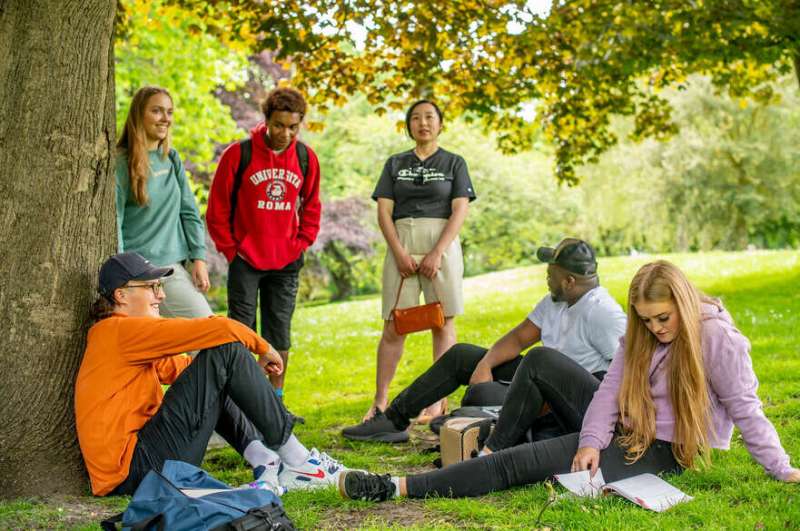This article has been reviewed according to Science X's editorial process and policies. Editors have highlighted the following attributes while ensuring the content's credibility:
fact-checked
trusted source
proofread
Young people need meaningful involvement in local authority environmental policy, says new report

A new report has called on local authorities to meaningfully involve young people in environmental policy after research showed they are feeling overwhelmed and disillusioned.
As part of the British Academy's Where We Live Next project, the report examines youth engagement in environmental issues, including how—in which spaces and under what conditions—it can lead to public policy that is sustainable at city and local level.
It was carried out by researchers from Royal Holloway University, Nottingham Trent University (NTU) and the University of Sheffield and focused on two case study cities of London and Nottingham.
To understand how young people think about climate change, and the changes they want to see, views were gathered via a survey of more than 2,000 young people aged 16–24, along with a world café discussion event and focus groups involving more than 100 young people.
Researchers also interviewed a range of Greater London Authority peer outreach workers, civic leaders involved in policymaking across London and Nottingham, representatives from Nottingham's universities and various civil society organizations.
For the young Londoners, their concerns were mainly personal, such as the impact of pollution on a family member's asthma or rubbish on their streets, and they expressed different attitudes to the environment depending on their social class and where they lived in the city. They often connected the environment to broader issues associated with "poor and ignored" neighborhoods, as well as to other issues which they considered a priority, such as crime and mental health.
In Nottingham, participants felt overall that the city was doing well in terms of public transport and green spaces, but some reported feeling sad, frustrated and having a strong sense of hopelessness when thinking about wide-ranging and irreversible environmental damage linked to climate change. They expressed concerns about global issues, particularly the impact of climate change around the world, including melting glaciers and polar icecaps, rising sea levels, extreme weather, and forest fires. They were also worried about plastic pollution and waste, such as littering, a lack of recycling opportunities, air and water pollution, and the loss of wildlife in their local communities.
When it came to solutions, young people felt that individual action would not have sufficient impact to address environmental issues. They also revealed feeling hopeless, powerless, and ultimately, having a deep sense of lack of usefulness. For some, this was connected to age, with older people perceived to have more power to make larger-scale changes compared to younger generations.
Many of them wanted the U.K. national government to take more action. When asked about solutions to environmental issues at the local level and the responsibility of local governments, the young people felt they had a lack of awareness and information. The majority of participants felt they did not know enough about environmental issues in general, and about ways to address environmental problems locally.
In the interviews with key local agents, policymakers stressed that they valued engagement with younger people and were committed to putting residents at the center of their decision-making.
However, the findings suggested that while there were more engagement opportunities for young people at the local level than at the national level, the quality of this local engagement and interactions with policymakers is often seen as lacking. For example, the inclusion of young people in events after the big decisions have already been made was seen to be somewhat tokenistic and a major stumbling block to effective engagement.
Where children and young people were engaged in such local initiatives, they were typically involved as "recipients" rather than more directly in two-way processes as active "co-producers" of such environmental and carbon-reduction projects.
Professor Matt Henn from NTU's School of Social Sciences, said, "There is an opportunity to use the enthusiasm of young people, and their local knowledge, to tackle environmental problems in their cities and neighborhoods. This would go some way to creating a more sustainable and future-oriented public policy in the places where they live.
"However, young people are currently not included early enough in the design of environmental initiatives or in policy making, and they are not provided with the educational tools or platforms for deliberation to engage more fully in the policy process.
"By providing better quality opportunities for engagement with young people, civic authorities would play their part in turning fatalism and pessimism amongst young people into hope and action—mainstreaming youth engagement in environmental issues and helping to restore some faith in democracy."
Professor James Sloam from Royal Holloway University added, "During COP26, there were many wonderful stories about how young people have led grass-roots initiatives across the world. But as the mass youth protests outside the conference venue and in cities across the world illustrated, young people do not feel they have a seat at the policy-making table.
"Our findings make for relatively sobering reading; young people lack confidence that their voices count for much in conversations about how best to address the climate emergency, while policymakers seem unsure regarding how best to engage young people in such matters.
"We recommend that young people from diverse backgrounds should be prioritized in local authority communications and community engagement, as well as ensuring their involvement in the design of local environment polices. More environmental education should also be offered in schools, including opportunities to take part in civic engagement and community projects."
The report connects to a wider body of work undertaken by NTU which explores democratic participation and engagement, alongside additional projects investigating methods of participation and links to local strategies on topics such as net zero and food poverty.
More information: Youth, Sustainability and Democracy: How Young People Can Shape Environmental Policy in Urban Spaces. www.thebritishacademy.ac.uk/pu … icy-in-urban-spaces/
Provided by Nottingham Trent University





















